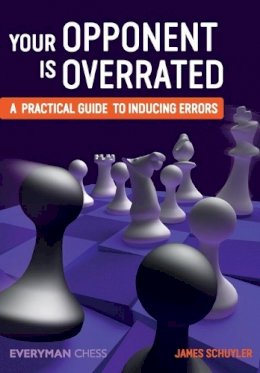14%OFF

Stock image for illustration purposes only - book cover, edition or condition may vary.
Your Opponent is Overrated: A Practical Guide to Inducing Errors
James Schuyler
€ 24.99
€ 21.43
FREE Delivery in Ireland
Description for Your Opponent is Overrated: A Practical Guide to Inducing Errors
Paperback. .
Which opening does better in practice: the wild, unsound" and refuted" Latvian Gambit (1 e4 e5 2 Nf3 f5) or the solid Philidor Defence (1 e4 e5 2 Nf3 d6)? As James Schuyler points out, referring to the definitive Megabase, the Latvian Gambit scores higher. How can such a discredited opening (and the same story is repeated with other unsound" openings) do so well? The point is that playing like this throws the opponent off balance, makes them anxious and induces mistakes. Even the very best players recognize the value of discomforting the opponent. Historically, Emanuel Lasker was the master of this approach and his modern day equivalent is world champion Magnus Carlsen. Carlsen frequently employs offbeat openings and his opponents invariably fail to counter them correctly. This is the key theme of this book. Schuyler covers all phases of the game and discusses other vital subjects such as harassment, material imbalance, time management, surprise moves, unusual ideas, provocative play, manoeuvres and recovering from bad positions. *Includes methods to improve practical play*Develops a win-oriented attitude*Examines ways to induce mistakes
Product Details
Publisher
Everyman Chess
Format
Paperback
Publication date
2017
Condition
New
Number of Pages
224
Place of Publication
London, United Kingdom
ISBN
9781781943526
SKU
V9781781943526
Shipping Time
Usually ships in 7 to 11 working days
Ref
99-50
About James Schuyler
James Schuyler is a FIDE Master. He was Nevada State Champion in 2007 and won the Vir-ginia State Championship in both 2011 and 2012. He has been teaching chess for over 25 years.
Reviews for Your Opponent is Overrated: A Practical Guide to Inducing Errors
The book deals with what every amateur would like to know, and has doubts about. It does this through an array of different topics, treated in different chapters, e.g. material imbalances, lost positions, clock, the endgame, etc. These topics are worth pursuing and reading about, because maybe they can shift our view and give us an extra edge in the next tournament game.
- Davide Nastasio, Georgia Chess
- Davide Nastasio, Georgia Chess
